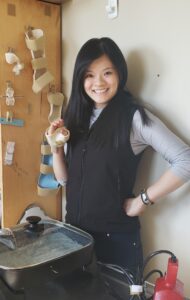In honour of October being national occupational therapy (OT) month, we spoke with a practicing OT and former ICORDian Clarice Kwok, as well as an ICORD PI and OT researcher, Dr. Ben Mortenson, to get the scoop on what OT is all about.
Clarice is a registered VCH OT who works at the Vancouver General Hospital Acute Spine Unit. Before becoming an OT, she worked as a UBC Work Learn student at ICORD while completing her Bachelor of Science and Master of Occupational Therapy.
Dr. Mortenson was a practicing occupational therapist for many years before making the transition into academia and research. He is now an ICORD Principal Investigator, as well as an Associate Professor in the UBC Department of Occupational Science and Occupational Therapy. You can learn more about Dr. Mortenson’s research here.
Now let’s hear what the OTs have to say!
Thanks for taking the time to answer some questions about OT. Could you start by providing a brief summary of what OTs do?
Clarice: OTs help individuals increase their independence and performance in functional activities, typically in the context of an injury or disability. Functional activities can include many things, including driving, getting dressed, cleaning, and more – whatever is meaningful to that individual!
Dr. Mortenson: OTs help people accomplish the daily things they need and want to do, essentially, the activities that occupy their time.
Clarice: Typically, patients that arrive in the Acute Spine Unit at VGH have a new spinal cord injury from a spinal abscess, tumour, degenerative changes, or traumatic injury that may limit their ability to return to everyday activities. The injuries are usually quite new to the patients, so the Spine OTs assess and work on improving the patients’ ability to do the activities they need to do in order to return home safely, such as being able to get dressed, cook, and manage their medications. We also determine if patients require further follow-up or services, such as in-patient rehabilitation or a home visit from a community OT for home modifications. For individuals who are new tetraplegics, we work on access to electronics, power wheelchair driving, progressing hand function, and more – it all depends on the goals and discharge disposition of the clients.
Dr. Mortenson, how is being a researcher different from being a practicing OT?
Dr. Mortenson: I have the same focus as a researcher, that is, to help people do the daily things they need and want to do but I do this less directly. Just as when I was a clinician, I focus on assistive technology such as wheelchairs and bath bars. I do research to understand the issues that people with disabilities encounter accessing and using assistive devices, develop and assess interventions to improve assistive technologies like scooter skills training and am involved in the development of new technologies.

Dr. Mortenson (centre) with some of his former grad students
In your opinions, what is most rewarding about being an OT?
Clarice: I love working with people and seeing the smiles on my patients when they are finally able to do an activity, even a simple one, that they previously were unable to do.
Dr. Mortenson: I think the big thing is feeling like you are making a difference in people’s lives through policy and practice changes.
Clarice, did working at ICORD have an impact on your current role as an OT?
Clarice: When I was completing my BSc, I thought my interest lay in basic science research. However, while I was at ICORD, I was exposed to a lot of clinical research, including that of Drs. Mortenson, Miller, Sawatzky, and Eng, which heightened my interest in the clinical side of healthcare. During the many years at ICORD as a Work Learn student, I learned a lot about the SCI population. I like to think that I have now come full circle by continuing to work with the SCI population, except this time not as a Work Learn student but as an OT!
On the flip side, Dr. Mortenson, has your past experience practicing as an OT influenced your role as an ICORD researcher?
Dr. Mortenson: As a OT I bring a different perspective to the work being conducted at ICORD. For example, if you think about research at ICORD spanning from cells to community, I focus more on the latter, especially in terms of the built and social environment.
What do you think are the three most important skills necessary for success in occupational therapy?
Clarice: Being client-centred, innovative, and able to adapt!
Dr. Mortenson: I think the best OTs I have worked with are those who 1) focus on people’s strengths rather than their deficits, 2) do not passively accept the status quo, and 3) are proactive in the face of change.
Lastly, what is one thing you wish everyone knew about occupational therapy?
Clarice: OTs can work in many areas and with a variety of populations including: ergonomics, low vision, paediatrics, mental health, acute care, return-to-work, medical legal assessments, eating disorders, hand therapy, home modifications, driver rehabilitation, dysphagia management, older adults, and more!
Dr. Mortenson: Although there are some OTs who focus on enabling employment, work is just one of the occupations that we help people with across the life span. Occupational therapy is about the job of living for everyone.
We hope you enjoyed this interview with Clarice and Dr. Mortenson as much as we did and that you learned some new information about occupational therapy. To hear about future blog posts and keep up with ICORD news, follow us on social media (links below)! Any burning questions about OT you wish we asked? Please share them in the comment section below!


